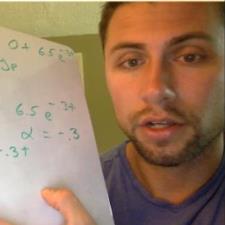
Christopher F. answered • 04/13/20
M.S. in Mathematics with 500+ hours in Calculus tutoring
Yes, f(x) is a polynomial, so it will be continuous and differentiable on any interval (a,b), [a,b], [a,b), or (a,b].
Now we can proceed to find all numbers c such that f'(c)= (f(b) - f(a))/(b - a) on [0, 2] where a=0 and b=2.
First, let's find f'(c):
f'(x) = 6x - 5, so f'(c) = 6c - 5
Now, let's calculate (f(b) - f(a))/(b - a):
(f(b) - f(a)) = (f(2) - f(0)) = (3(2^2) - 5(2) + 2) - (3(0)^2 - 5(0) + 2) = 4 - 2 = 2
b - a = 2 - 0 = 2
So (f(b) - f(a))/(b - a) = 2/2 = 1
Setting f'(c) equal to 1:
6c - 5 = 1
6c = 6
c = 1




